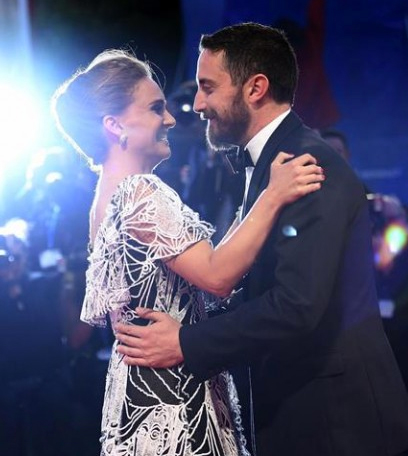 Portman and Pablo at the premiere of JACKIE (2016)by Nathaniel R
Portman and Pablo at the premiere of JACKIE (2016)by Nathaniel R
Pablo Larraín, currently Chile's most celebrated director, first broke into the festival circuit via his second film, the violent and disturbing Tony Manero (2008). I found it so upsetting that I thought I'd never risk another one of his features. That resolve didn't last long. His international breakthrough No (2012), was a hit with audiences, critics, and the Oscars and surprisingly enjoyable too. But due to the always unpredictable release dates of movies, we didn't see his work again until 2016 and then there were three movies at once, the sex predator priest drama El Club, the playful writer on the lam whatsit Neruda, and of course the outstanding Oscar hopeful Jackie.
You might call this Pablo's Year but for the fact that he doesn't coddle the audience and his films are as likely to unsettle and challenge as they are to reward you with their significant pleasures like fascinating performances, strong themes, unexpected humor, and emotional acuity.
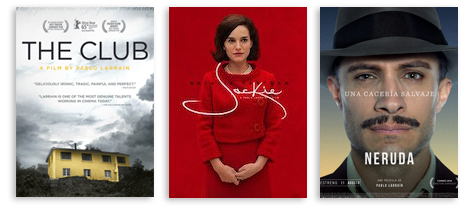
When we found an opportunity to talk I figured I'd jump into the deep end about the unsettling nature of so many of his features. Our interview follows...
NATHANIEL R: Having seen all but one of your movies, I'm just going to jump right in with the tough question. Your movies are often brutal and politically aggressive. Do you feel like you're that intimidating in real life... or that people perceive you to be?
PABLO LARRAIN: Well, it's funny. Some people think I'm a tough brutal dude. I don't know man, I have children. I take them to school. I have a simple regular life. Some of the movies have portrayed a specific kind of violence. But I'm more interested in the consequences of the social process that produce the violence. I don't know if you had that in your life if you could actually make those movies.
NATHANIEL R: I see what you're saying.
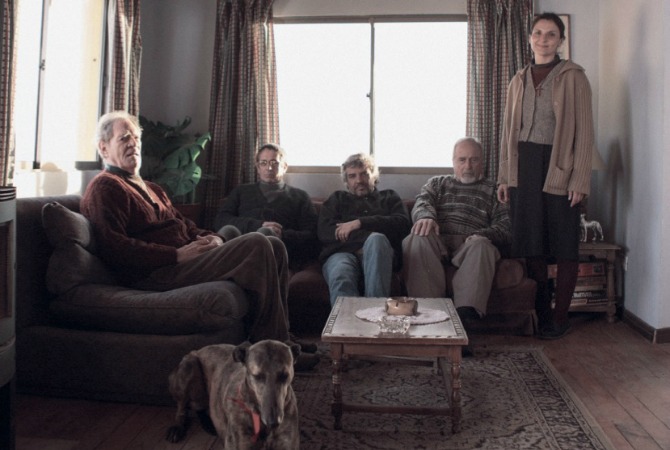 Monsters or humans in THE CLUB (2015)
Monsters or humans in THE CLUB (2015)
PABLO LARRAIN: I try to love [the film characters] even if they're the meanest people. You have to understand them and have compassion no matter who they are. For example The Club. People were surprised when I told them I actually do care about those guys and I understand them somehow. I don't support what they did as characters but you can't approach them and look at them if you don't care about them. You have to have compassion. There has to be humanity otherwise it's just like a portrait of furniture. We're trying to explore humans here.
That comes across. Maybe brutal isn't the right word. It's not so much the violence as that your movies are psychologically confrontational. You have to actually sit with these people and consider their lives.
This is the kay to the type of cinema I'm interested in. You create a portrait of a emotion or psychological sensation but the one that completes that idea is the audience and there's nothing more violent than people's minds. When you're able to trigger that, the spectator will finish the movie. That's what's really violent. I don't finish it, the audience does. I think this process is beautiful and interesting.
There's an emerging theme in your films that history is shaped by those who seize or write the narrative. You can see that in Neruda and of course with No and Jackie it's actually the main plot. Your parents were politicians, correct?
My mother worked for a specific government but did not have a full time political career like my father had. But, yes, my family is very politically involved.
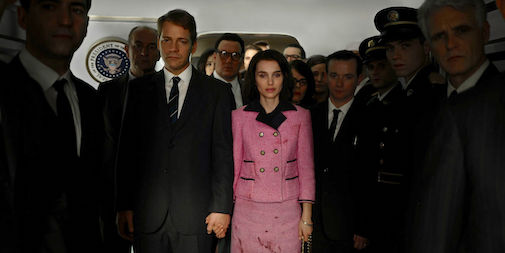
The idea of who controls the story is so strong. This private shaping of public events...
Yes, what I'm interested in is people trying to achieve something that will affect others. There's always a gap between intention and result. That black hole is where you look, that's where fiction can enter.
I'm interested in social process and how that affects individuals. Some individuals are more important like Jackie and some as in Post-Mortem, they're just a victim of their environment. But everyone is affected in an unconcious way. That's where I think we can work. The tools of cinema allow you to dig there and see what happens when you make a provocation. You create tension, and where there's tension, there's danger. And where there's danger, there's art.
The combination you need for cinema are three elements: curiousity, love and rage.
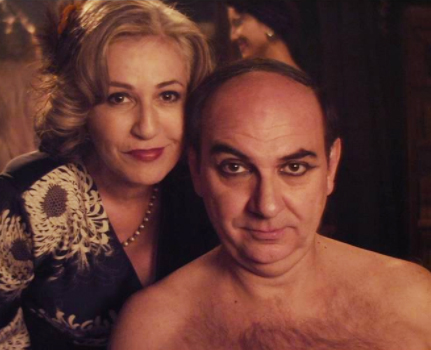 Mercedes Moran & Luis Gneccho in NERUDA (2016)Interesting! I love the breakdown.
Mercedes Moran & Luis Gneccho in NERUDA (2016)Interesting! I love the breakdown.
When you work with actors like Natalie Portman as Jackie and Luis Gneccho as Neruda. Did you discuss this public / private gap. Like, 'Play this on two levels!'
Not necessarily. What I do with actors is we just talk over coffee for hours about the characters but I don't want them to be so conscious of what they're doing. That's my job. Like 'Hey, Luis, you're Neruda!' or 'Natalie, you're Jackie Kennedy!" It could be very paralyzing. What I try to do is 'Look, these people can never be fully grasped. We can't do it so take it easy. If we help the audience feel what the character are feeling, we're making a movie.' This gives you a lot of freedom.
This gives you a lot of freedom. After all the research and years of Neruda and Jackie I still don't know who these people really were but I can tell you that we did find emotions. It's hard to talk about. It's like talking about music. You have to listen to it. You have to feel it.
Do you feel like what's in your head cinematically when you start is what is there once you're finished with the movie or does it change?
Some directors I admire so much, for example, the Coen brothers who write the script and then storyboard and then edit. I assume they know exactly what the movie is going to be. I can't do it like that. I enjoy working on something that has undetermined consequences. It's like fabricating an accident. If I knew exactly what it would be, maybe I wouldn't be interested.
Your production team on Jackie is outstanding. It feels like these people were bringing their own genius to the project. Kind of in the way the editing in No elevated that whole film. I'm thinking particularly of the score and the production design this time around. Those huge open spaces somehow feel as claustrophobic as the plane.
I agree.
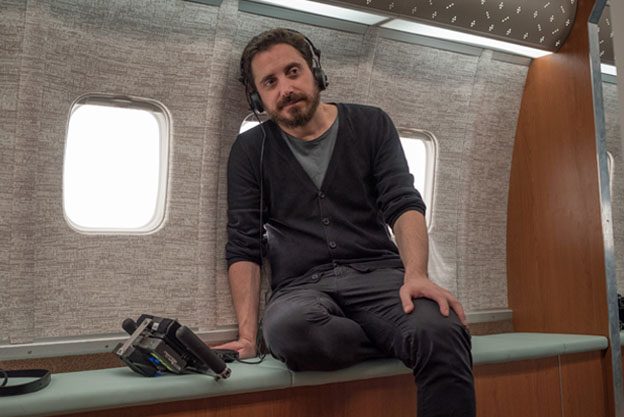 Larraín in the confines of the JACKIE (2016) set.
Larraín in the confines of the JACKIE (2016) set.
So with the team are you just saying "go for this feeling!" or are they surprising you?
I understand what you're asking but there's a different relationship with the team than with the actors and vice versa. [Production Designer] Jean Rabasse -- that guy is, like, cosmic! Same with the cinematographer Stéphane Fontaine and the costume designer Madeline Fontaine -- I couldn't believe my eyes. These people were geniuses, these people who handcraft things.
[With the team] I try to express myself as much as I can. Sometimes I feel they're not understanding everything but maybe I don't either. Again it's hard to talk about. You're talking about sensations and colors. I don't want to say spiritual -- that word -- but you feel something on the set. 'This is right,' 'This is not right.' You try to get away from the things that are not working. The movie starts to take shape. It's like a band. We're trying to play jazz. The first rehearsal is always horrible.
[Laughter]
Who's playing what? We move on. The film crew are the musicians and you can be the conductor. And sometimes you're the conductor and the composer. At some point it sounds right.
You've been to the Oscar's before for No (2012). The three guiding emotions of cinema you mentioned before: Curiosity, Love, and Rage. What percentage of those were you feeling that night?
No, no, no, man. Those are the elements a movie needs, not your attitude on awards night! I think Amour is great and when we lost, we lost to a giant. I was totally fine. When they announced "Amour!" I'm like "Sure!". That's an incredible movie.
 NO (2012) was Oscar nominated for Best Foreign Language Film
NO (2012) was Oscar nominated for Best Foreign Language Film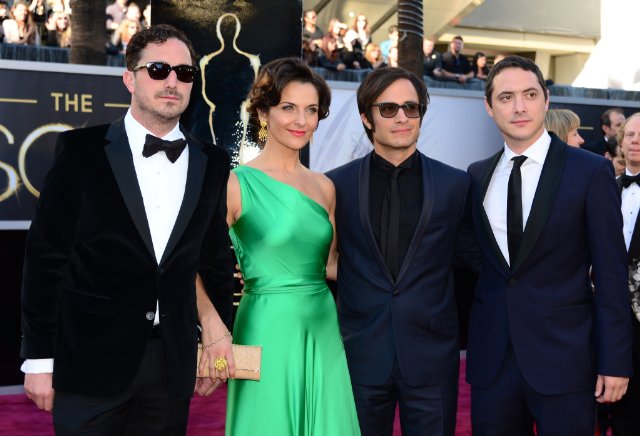 Oscar night for NO
Oscar night for NO
NATHANIEL R: What's your general feeling about awards for movies and Oscar season?
PABLO LARRAIN: What I think is good about them is that you get to talk about your work and it creates more interest in the films. It's a spectacle as simple as that! I know filmmakers who I love and respect that don't care if there movies are seen but I do. I want as many people as possible to see them. Awards help.
I'm an Academy member and the Academy is gaining a lot of diversity lately. You get to see a movie like Moonlight and it's a beautiful piece of work and then everyone wants to protects it. I'm a South American guy coming here and making a movie about an American icon. I've been very lucky to have the confidence and trust of people I admire like Darren Aronofsky and Natalie Portman and the French crew I talked about.
It's amazing. I have an opportunity to vote and protect the cinema I'm interested in. In a world that is just in these very strange circumstances all over --it's good that there are people in the world that care about cinema and art. That gives you some hope.

Jackie is currently playing in select cities
Related
Neruda and Jackie - Reviews
Gael García Bernal - Neruda interview
Billy Crudup -20th Century Women & Jackie interview
Other Recent Interviews
Denis Villeneuve (Arrival), Asghar Farhadi (The Salesman), Nicole Kidman (Lion), Chris Kelly (Other People), Jessica Chastain (Miss Sloane)